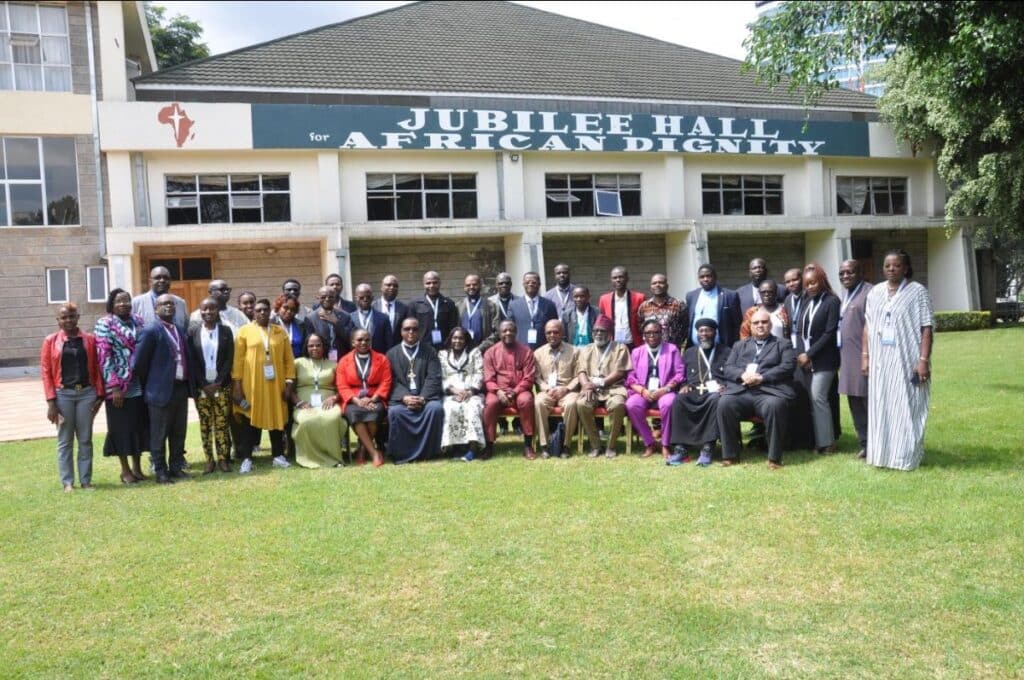Christian Council of Ghana
Ghana
|
Donations |
|
To make an online gift to this project click here Select Africa from the designation list and type Christian Council of Ghana into the Project/Partner line. To make a gift by check to this project click here. |
Ghana is one of West Africa’s most stable countries, financially and politically. It receives thousands of refugees from neighboring countries, such as Sierra Leone, where strife is abundant. Ghana’s vibrant tourist industry attracts thousands of tourists annually. The country has large Muslim and Christian populations and the two groups work hard at good relations. Global Ministries partners in Ghana are the Evangelical Presbyterian Church and the Christian Council of Ghana.
The Christian Council of Ghana (CCG) celebrated 75 years of service in October 2004. CCG was originally formed to provide a forum for coordinating programs of Protestant churches in the then Gold Coast (now Ghana), and to evolve a common policy on mission for the guidance of the churches. The Council is a fellowship of churches, which have agreed to witness together in fellowship and service to the Glory of God. Major concerns of the Council are Justice, Peace, Unity, and Reconciliation; the Council works to strengthen and to support its member churches to improve and expand the scope of their witness and service with the worldwide ecumenical fellowship.
The following are examples of the programs supported by the CCG:
The Annual Inter-Church Women’s Conference
The theme in 2004 was “Fidelity in marriage and relationships: the role of the woman.” Delegates from all the Member Churches and ten Local Councils of Churches participated in the five-day conference. Sub-themes included “Factors that lead to infidelity”, “Effects of infidelity on spouses, children, church and society” and “The role of women in curbing infidelity in marriage and relationships.”
Several factors, including polygamy and power relations, were identified as accounting for infidelity. Because the effects are devastating, the women tasked themselves to promote fidelity by improving on socialization processes in homes, knowing and asserting their basic human rights and advocating change in policies that impoverish females.
Challenge: Many more women would have attended the program, but were prevented from doing so because of financial constraints. The challenge that faces the Council then is how to raise more money to support this program and make it beneficial to as many women as possible.
HIV/AIDS Compassion Training Sessions
Two three-day seminars were held to address topics of “Basic facts about HIV/AIDS situation in Ghana,”“HIV world view,”“Culture and religion,” “Stigma and discrimination,” “Behavior change,” “Journey of hope,” “Counseling and AIDS victims,” “Compassion,” and “Care and support.”
Many of the participants were seeing for the first time the seriousness and the reality of the pandemic and pledged to wage a relentless war against the disease.
Two separate associations were immediately formed as a result to begin teaching compassion for People Living with HIV/AIDS (PLWHA) in the towns that hosted the training.
Challenge: Though the prevalence rate is higher in the areas where the training occurred (8-9 percent) as opposed to the national average of 3.2 percent, many people are still silent over PLWHA because of the stigma.
Women to Women Solidarity Visit to Sudan
Five women from Ghana made a solidarity visit to women and children refugees in Khartoum, Sudan. The hundreds of women visited expressed emotional relief that at least some people somewhere where listening to them. The report of this visit is being circulated globally to solicit assistance for the Sudan crisis.
Interfaith Education
For many decades Christians and Muslims have lived in harmony in Ghana, but the 1980s through 2000 saw the eruption of violence and conflicts in several parts of the country. The Interfaith Unit of the Council championed the education of Christians on the crucial need for peaceful coexistence and tolerance among the people of different religions in the country to reduce the underlying causes of these conflicts and violence; misunderstanding, misinformation, polemics, and stereotypes.
Youth Workshops
Leaders met to discuss how to educate youth on the need to coexist with and tolerate people of other faiths, especially Muslims.
Women’s Workshops
A similar Christian-Muslim relations education workshop for churchwomen leaders cover topics such as: “Arabia before Islam,” “Muhammad and the Muslim,” “the Christian and Muslim scriptures,” “Jesus in the Quar’an,” “Christian-Muslim intermarriages,” and “Christians and Muslims as neighbors.”
Results: Participants agree that the program is immensely helpful, even though it sparks lively debate. Furthermore, participants came to recognize that continued emphasis on a neighbor’s weaknesses creates more apprehension than friendship and so should be avoided.
Youth And Children
Annual Inner-Church Youth Conference
The Annual Inner-Church Youth Conference was held in December 2004 in Tema. The theme was “Fidelity in relationship: The role of youth.” Topics discussed were; “What is fidelity and how can it be promoted,” “A reflection on the theme,” “Preparation towards marriage,” and “Relationship between infidelity and HIV/AIDS.”
During the group discussions, the youth had the opportunity to extensively discuss the issues raised in the presentations.
A communiqué at the end of the conference called on member churches to:
· Set up youth friendly counseling units
· Have a standard guiding document for marriage in the church
· Encourage peer counselors
Special Projects
“Window of Hope Project” (WOH)
The Window of Hope is an HIV/AIDS project, which targets children between the ages of 8-14 years old. The objective of the project is to provide education on sexual and reproductive health issues to young people and to encourage them to make responsible and informed decisions about sex and sex related issues.
Several schools in Ghana have Window of Hope Clubs where members meet regularly to discuss sexual and reproductive health issues. Some organize drama and rallies during holidays and during the weekends to educate the public.
The School Dropout Scholarship Program
The purpose of this program is to identify the causes, consequences of school dropout rates at the Buduburam Refugee Settlement and recommend solutions for the prevention or reduction.
Support this Ministry
To make a gift for this ministry online or by check use the online donation page.
- 100% of your gift will be directed to Christian Council of Ghana
- You will receive updates on the work in this area as they become available
- Share in the vision of God’s abundant life for all people
Related Content
African churches consult on decolonization, reparations
African Church leaders, theologians, and academicians attending a theological consultation on...
Read MoreDear Secretary Rubio: Don’t Close Embassies in Africa
There is a concerning proposal to close several U.S. embassies and consulates in Africa,...
Read MoreGlobal Ministries is Saddened to Learn of the Death of Dr. Gene Johnson
Dr. Gene E. Johnson died April 2, 2025, at age 96 at the Seminary Village, Galesburg, IL. He...
Read More

